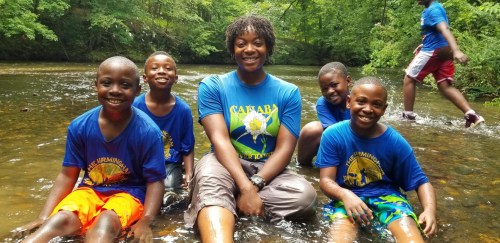By Erica Wright
The Birmingham Times
Growing up as an “outdoors girl” has come in handy for Cahaba River Society Environmental Science Educator La’Tanya Scott.
Her job is to give students hands-on environmental education through stream walks, canoe trips, and classroom programs in the Cahaba River watershed—a major drinking water source for the Greater Birmingham area.
Scott, 28, works with a broad range of students, including rising third graders, high schoolers, and even some adults.
“I get so excited when we book field trips with third and fourth graders because they’re so young and their brains are like sponges,” she said. “I get excited for all classes and all students to come out to the river with us because it’s something that is mostly not in their norm.”
Scott feels her personality helps her connect with students.
“I choose to be relatable to students. I choose to be on their level, so they can understand that I’m a friend and I’m knowledgeable,” she said. “I want them to enjoy themselves, learn from our program, and [get] something different [out of it].”
Scott, who has been with the Cahaba River Society for the past five years, started working the group while still a student at Miles College. She worked part-time while in school and got a full-time position after she graduated.
“We have served about 1,841 people in 2018,” said Scott, who teaches the Shane Hulsey Children Linking the Environment Across the Nation (CLEAN) program. “Throughout the history of the CLEAN program, we have taken more than 37,000 students and teachers out to the Cahaba River.”
Through her work, Scott is able to share her love of nature—just like her parents shared with her when she was growing up.
Outdoors Girl
Scott was raised in Temple, Ga., with her parents, Tanya and Courtney Scott Sr., and her older brother. Her mother was a nurse, and her father was a forklift operator. Her parents would take the family on camping, fishing, and hiking trips, which instilled in her a love for nature and adventure.
During one trip, however, tragedy struck.
“When I was in elementary school, my father drowned in Lake Wedowee in Alabama on July 22, 2000. My mom [nearly] drowned, too. If the guy on the shore hadn’t seen my mother’s fingertips, she would’ve been gone,” Scott said. “After that, we had a single-parent home, but my mother still enjoyed fishing and camping, and she still encouraged my brother and me to go outside, to be active, … and to play sports. She was a very strong woman.”
Aside from enjoying the outdoors, Scott loved basketball, which she started playing in second grade.
“I wanted to be the first woman in the NBA,” she said. “I was actually pretty good and got recruited by a lot of different colleges. I got flown to different schools to try out for their teams, but I lived in a very sheltered household. If anything involved me leaving for too long or going too far, it probably wasn’t allowed.”
Scott attended high school at Southwest Atlanta Christian Academy in Atlanta, Ga., and graduated in 2008. She then attended Gadsden State Community College in Gadsden, Ala., where she continued to play basketball.
“I decided to play there because it wasn’t too far from my mother,” she said.
From there, Scott transferred to Miles College, where she found and majored in a subject she loved: environmental science.
“I liked the environmental science program at Miles because it had all the areas I was interested in from chemistry to geology and ecology all in one . . . since I was a little girl, I would . . . find stuff and explore and watch the Discovery channel all day and all night and I remember begging my mom for a microscope . . . the first time I saw one, I was in college and it totally blew my mind,” she said.
While at Miles, Scott continued to play basketball and focused on her studies.
“I was really the person who woke up in the morning, went to basketball practice, went to breakfast, then class, then back to basketball practice, to study hall, and then home,” she said. “That was my routine.”
When Scott graduated from Miles in 2014, the Cahaba River Society position was waiting for her.
Relationship with Nature
Since August 2017, the CLEAN program has tutored people of all ages from dozens of schools and organizations across Alabama in urban, rural, and economically disadvantaged communities.
Scott typically spends her days at the river with participants from schools, scout troops, youth organizations, summer camps, civic clubs, and sometimes professional groups. Her goal is to get more Birmingham city youth out to the river “[to] show them a different learning perspective, … so they can also get a feel for nature and see how close it is to them because they may not get to see it otherwise.”
Scott wants to instill the love of outdoors that was planted in her.
“Just like my parents did for me, … I would like to introduce [kids] to nature early, [so they] have a relationship with nature,” she said. “Right now, technology is taking over the world, and there is a great increase in nature deficit disorder.”
Scott said it’s “breathtaking” to see students come outdoors and say, “‘[I’ve] never spent this much time outside’ … or ‘black people don’t do this.’
“I had one student tell me he had never touched a tree until that day. I thought, ‘How can you not touch a tree?’ But I realized that they don’t go outside, so it’s important to teach [people when they’re] young to appreciate our resources.”




